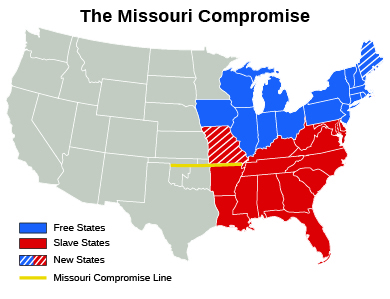| << Chapter < Page | Chapter >> Page > |
Most disturbing for the unity of the young nation, however, was that debaters divided along sectional lines, not party lines. With only a few exceptions, northerners supported the Tallmadge Amendment regardless of party affiliation, and southerners opposed it despite having party differences on other matters. It did not pass, and the crisis over Missouri led to strident calls of disunion and threats of civil war.
Congress finally came to an agreement, called the Missouri Compromise , in 1820. Missouri and Maine (which had been part of Massachusetts) would enter the Union at the same time, Maine as a free state, Missouri as a slave state. The Tallmadge Amendment was narrowly rejected, the balance between free and slave states was maintained in the Senate, and southerners did not have to fear that Missouri slaveholders would be deprived of their human property. To prevent similar conflicts each time a territory applied for statehood, a line coinciding with the southern border of Missouri (at latitude 36° 30') was drawn across the remainder of the Louisiana Territory ( [link] ). Slavery could exist south of this line but was forbidden north of it, with the obvious exception of Missouri.

On April 22, 1820, Thomas Jefferson wrote to John Holmes to express his reaction to the Missouri Crisis, especially the open threat of disunion and war:
I thank you, Dear Sir, for the copy you have been so kind as to send me of the letter to your constituents on the Missouri question. it is a perfect justification to them. I had for a long time ceased to read the newspapers or pay any attention to public affairs, confident they were in good hands, and content to be a passenger in our bark to the shore from which I am not distant. but this momentous question [over slavery in Missouri], like a fire bell in the night, awakened and filled me with terror. I considered it at once as the knell of the Union. it is hushed indeed for the moment. but this is a reprieve only, not a final sentence. a geographical line, coinciding with a marked principle, moral and political, once concieved [sic]and held up to the angry passions of men, will never be obliterated; and every new irritation will mark it deeper and deeper. I can say with conscious truth that there is not a man on earth who would sacrifice more than I would, to relieve us from this heavy reproach, in any practicable way. . . .
I regret that I am now to die in the belief that the useless sacrifice of themselves, by the generation of 76. to acquire self government and happiness to their country, is to be thrown away by the unwise and unworthy passions of their sons, and that my only consolation is to be that I live not to weep over it. if they would but dispassionately weigh the blessings they will throw away against an abstract principle more likely to be effected by union than by scission, they would pause before they would perpetuate this act of suicide themselves and of treason against the hopes of the world. to yourself as the faithful advocate of union I tender the offering of my high esteem and respect.
Th. Jefferson
How would you characterize the former president’s reaction? What do you think he means by writing that the Missouri Compromise line “is a reprieve only, not a final sentence”?
Access a collection of primary documents relating to the Missouri Compromise, including Missouri’s application for admission into the Union and Jefferson’s correspondence on the Missouri question, at the Library of Congress website.
The Missouri Crisis created a division over slavery that profoundly and ominously shaped sectional identities and rivalries as never before. Conflict over the uneasy balance between slave and free states in Congress came to a head when Missouri petitioned to join the Union as a slave state in 1819, and the debate broadened from simple issues of representation to a critique of the morality of slavery. The debates also raised the specter of disunion and civil war, leading many, including Thomas Jefferson, to fear for the future of the republic. Under the Missouri Compromise, Missouri and Maine entered the Union at the same time, Maine as a free state, Missouri as a slave state, and a line was drawn across the remainder of the Louisiana territory north of which slavery was forbidden.

Notification Switch
Would you like to follow the 'U.s. history' conversation and receive update notifications?